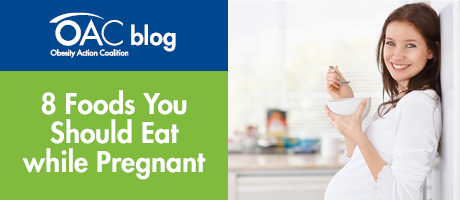
8 Foods You Should Eat while Pregnant
by Nicole Avena, PhD

There are many key nutritional needs during pregnancy, which can make it difficult to know if you are getting enough of each nutrient. Even when you’re not pregnant, eating a well-balanced, varied diet can sometimes be harder than not. Some essential vitamins and minerals that you need to be aware of for a successful pregnancy include, but are not limited to, folate, calcium, iron, magnesium, B12, fiber, DHA and EPA, choline, zinc, etc.
We need so many different nutrients because all the nutrients in our bodies work together, not alone. It is important to incorporate ‘nutrient dense’ foods into your diet so that you get many nutrients all at once without having to increase caloric intake. By eating nutrient dense foods, you won’t have to worry as much about making sure you meet all of your nutrient requirements. This also means you will be increasing your intake of fruits, vegetables, and whole grains–the key to a healthy diet.
Pregnancy follows three stages (three trimesters) in which different things are going on developmentally with your baby. There is a wide variety of certain foods you can focus on during each trimester, but some foods you may want to incorporate into your diet throughout your pregnancy to reap the health benefits. Don’t stress about trying to reach each nutrient’s requirements on a daily basis, that would require a lot of planning and may cause you to overeat. Instead, focus on a varied, nutrient dense diet that allows you to meet the nutrient requirements over a couple of days. Balance is key.
- Lentils – lentils are an excellent source of folate, a key nutrient during pregnancy (particularly the first trimester) that is crucial for healthy cell division and prevents neural tube defects. Lentils are a nutrient dense food also packed with fiber, iron, protein, phosphorus, vitamin B6, potassium, zinc, copper, and other nutrients. One cup of cooked lentils has more than half of your daily requirement for folate, so eat up! Try black beans, chickpeas, or root veggies like squash for extra fiber (and nutrients) to help with constipation that may begin to set in around the second trimester.
- Kale – this nutrient dense bitter green could practically be considered a pregnancy superfood. In just two cups you’ll find 5g of fiber, one-fifth of your daily calcium, and 2mg of iron, with no shortage of other nutrients such as potassium, folate, vitamin C, A, K, E and B6, niacin, phosphorus, zinc and magnesium.
- Wild Salmon – Wild salmon contains essential omega 3 fatty acids, EPA and DHA, that promote healthy brain development throughout pregnancy (and after). A 3oz serving of salmon will also provide 17g of protein and almost half your daily B12, another necessary vitamin for healthy brain development that is only found in animal sources.
- Sweet potato – you may just think of carbs when you hear potato, but sweet potatoes are actually very high in potassium, iron, magnesium, phosphorus, and vitamins A, C and K. They may even help to ease any nausea or morning sickness. Bananas have a similar nutritional profile and may also help prevent or ease any stomach upset.
- Eggs – eggs get a bad rep for being high in cholesterol, but well-cooked eggs (to avoid salmonella) are an excellent addition to any diet. Egg yolk is a good source of choline, which like folate and B12, may help lower risk of neural tube defects. The combination of monounsaturated fats and protein may also help keep you fuller longer and avoid overeating throughout the day.
- Quinoa – Referred to as a “pseudo-cereal” since it is the actually the seed of a grain crop, quinoa has an astounding nutritional profile. Aside from being a gluten free grain, quinoa is high in protein, fiber, iron, magnesium, phosphorus, potassium and zinc. Try swapping out your next pasta or rice dish for quinoa instead.
- Chocolate – Eat chocolate not only for your sanity, but for your health too! Dark chocolate (at least 70%) has been shown to help reduce blood pressure and increase insulin sensitivity during pregnancy when eaten in modest amounts. Not to mention it also contains iron, magnesium, phosphorus, potassium, zinc, niacin and monounsaturated fatty acids.
- Cheese or yogurt – calcium is essential for your baby’s growing bones, and dairy products such as cheeses (like Swiss) or yogurts (low-fat or fat-free) are excellent sources of calcium along with other nutrients such as protein, phosphorus and vitamin B12. Make sure to only eat pasteurized cheese due to the potential risk of food-borne illnesses.
With all the conflicting information out there, it can be difficult to understand what eating healthy even means, especially during an exciting, nerve wracking, and complex time of life such as pregnancy. At the end of the day, your pregnancy journey will be much smoother, healthier, and happier if you remember a few basic tips: eat a varied diet filled with fresh fruits, vegetables, whole grains and proteins, cut out fried or highly processed foods, and listen to your body’s needs. A balanced diet filled with whole foods will make you feel better and help your baby develop in the best way possible.
Special thanks to Katherine Bishop, M.S., for her assistance with this post.
About the Author:
Dr. Nicole Avena is a research neuroscientist, author and expert in the fields of nutrition, diet and addiction. She received a PhD. in Neuroscience and Psychology from Princeton University, followed by a postdoctoral fellowship in molecular biology at The Rockefeller University in New York City. She has published over 70 scholarly journal articles, as well as several book chapters and books, on topics related to food, addiction, obesity and eating disorders. She also edited the books, Animal Models of Eating Disorders (2012) and Hedonic Eating (2015), coauthored the popular book of food and addiction called Why Diets Fail (Ten Speed Press), and recently finished her new book, What to Eat When You’re Pregnant, which is available now for presale and in bookstores June 9th. Her research achievements have been honored by awards from several groups including the New York Academy of Sciences, the American Psychological Association, the National Institute on Drug Abuse, and her research has been funded by the National Institutes of Health (NIH) and National Eating Disorders Association. To learn more about Dr. Avena, please visit www.drnicoleavena.com, twitter.com/DrNicoleAvena, or www.facebook.com/DrNicoleAvena.


[…] 8 Foods You Should Eat while Pregnant […]